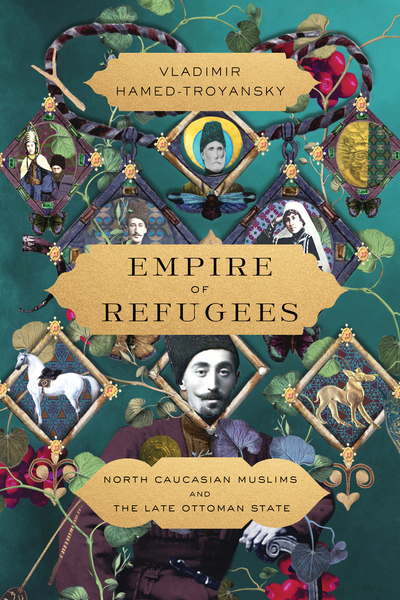
February 2024
360 pages.
from $32.00
Paperback now $16.00 (50% off)
Hardcover ISBN: 9781503636965
Paperback ISBN: 9781503637740
Ebook ISBN: 9781503637757
Gold Medal in the History (World) Category for the 2024 Independent Publisher Book Awards (IPPYs).
Between the 1850s and World War I, about one million North Caucasian Muslims sought refuge in the Ottoman Empire. This resettlement of Muslim refugees from Russia changed the Ottoman state. Circassians, Chechens, Dagestanis, and others established hundreds of refugee villages throughout the Ottoman Balkans, Anatolia, and the Levant. Most villages still exist today, including what is now the city of Amman. Muslim refugee resettlement reinvigorated regional economies, but also intensified competition over land and, at times, precipitated sectarian tensions, setting in motion fundamental shifts in the borderlands of the Russian and Ottoman empires.
Empire of Refugees reframes late Ottoman history through mass displacement and reveals the origins of refugee resettlement in the modern Middle East. Vladimir Hamed-Troyansky offers a historiographical corrective: the nineteenth-century Ottoman Empire created a refugee regime, predating refugee systems set up by the League of Nations and the United Nations. Grounded in archival research in over twenty public and private archives across ten countries, this book contests the boundaries typically assumed between forced and voluntary migration, and refugees and immigrants, rewriting the history of Muslim migration in the nineteenth and early twentieth centuries.
About the author
Vladimir Hamed-Troyansky is Assistant Professor of Global Studies at the University of California, Santa Barbara.
"A brilliant tour de force. Vladimir Hamed-Troyansky offers a detailed, revisionist understanding of the beginnings of the modern refugee regime."
—Dawn Chatty, University of Oxford
"Magnificent and magisterial. Empire of Refugees not only reveals the emergence of a new template for refugee flows in the modern world, but it also captures the human experiences of the refugees themselves: their sorrows, hopes, failures, and successes. A prodigious achievement."
—Michael A. Reynolds, Princeton University
"Empire of Refugees is a meticulously researched and imaginatively conceived history of mass migration that represents a genuinely fresh contribution to both late Ottoman history and global refugee studies."
—Laura Robson, Pennsylvania State University
"Empire of Refugees offers a fresh take on the late Ottoman state and how the refugee question was a factor in many important events towards the end of the empire. A unique perspective on an under-explored topic, the book enriches Ottoman studies and makes for compelling reading for anyone interested in history."
—Usman Butt, Middle East Monitor
"The book thrusts the North Caucasus firmly into the center of immigration and diasporic studies, and it reminds us of the contribution of Ottoman-Russian relations for the history of international law and humanitarian relief."
—Lucien Frary, The Russian Review
"Empire of Refugees stands as an exceptional resource for anyone interested in global migration, refugee governance, and migration and resettlement policies. I highly recommend its inclusion in curricula for disciplines such as history, refugee studies, international relations, anthropology, and sociology."
—Fulya Pinar, Critical Forced Displacement
"To tell this story, Hamed-Troyansky relies on a breathtaking diversity and depth of sources: twenty-three archives across ten countries, private papers and letters, and even interviews. He tells stories of imperial politics, local bureaucratic management, urban socioeconomic changes, and family microhistories."
—Will Smiley, Jotwell
"Through meticulous interpretation and deft analysis of primary source materials written in the mutually unintelligible languages of the great imperial triad: the Caucasus, tsarist Russia, and the Ottoman Empire, this monograph emerges as a striking example of groundbreaking scholarship, which has already prompted shifts in our understanding of the entangled history of migration and displacement in the Caucasus region during the nineteenth and early twentieth centuries."
—Sergey Salushchev, Journal of Caucasian Studies
"Hamed-Troyansky's main success lies in his combination of imperial and migration history. This juxtaposition allows us to comprehend how Ottoman and Russian rulers sought to avail themselves of the muhajirs while the latter equally sought to instrumentalize imperial structures in order to survive. As such, the title of the book acquires a facetted meaning ingeniously implied. Empire of Refugees undermines current myths surrounding migration and the political fronts surrounding it."
—Paul Csillag, CEU Review of Books